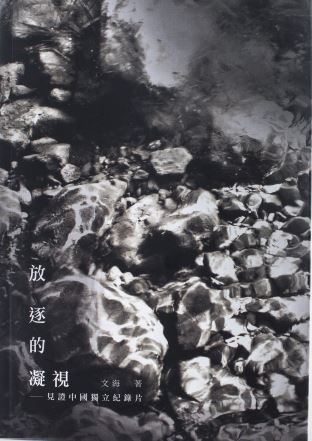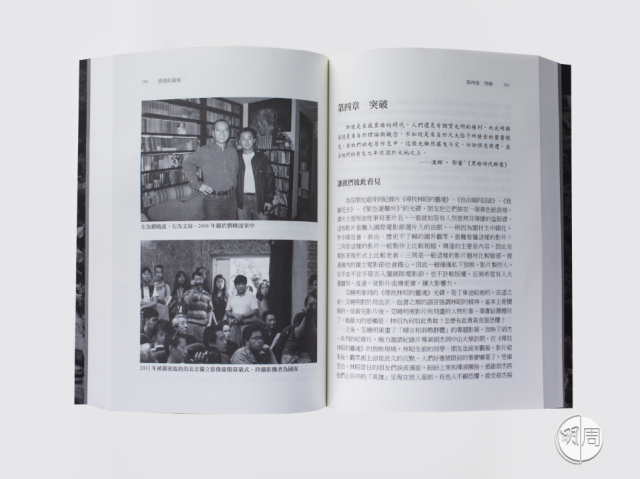Book review by Janice entitled “The Truth that Cannot be Suppressed” of Wen Hai’s “The Gaze of Exile – The Testimony of China ‘s Independent Documentaries” in Hong Kong’s Ming Pao Weekly November 9, 2016
书评:禁不住的真實/Janice :文海 《放逐的凝視─見證中國獨立紀錄片》 2016年11月9日 香港明报周刊
 When I saw, leafing through a book about the survival of Chinese independent films, these words on the copyright page the words “dedicated to Hong Kong as it holds on tightly to liberty amidst the wind and the rain”, I immediately wanted to read it. Living in Hong Kong, one still hears some news about how the directors of Chinese independent films get into trouble after their films are shown. In some places, whether a film is considered to be “independent” or not depends upon still depends upon the sources of its funding and the scale of the production. In China, “independent” means that the business world deliberately rejected it, the censor system opposes it and sometimes even the person safety of some people is at risk. In Hong Kong, where the storm clouds are getting thicker and darker with each passing day, are there people willing to evade eyes that would inspect and control their work, and seek the high moral ground of being a witness to history? Are they willing to disregard both the subtle and overt threats of those in power and as intellectuals, as Zeng Jinyan wrote in her preface called the responsibility of the intellectual class?
When I saw, leafing through a book about the survival of Chinese independent films, these words on the copyright page the words “dedicated to Hong Kong as it holds on tightly to liberty amidst the wind and the rain”, I immediately wanted to read it. Living in Hong Kong, one still hears some news about how the directors of Chinese independent films get into trouble after their films are shown. In some places, whether a film is considered to be “independent” or not depends upon still depends upon the sources of its funding and the scale of the production. In China, “independent” means that the business world deliberately rejected it, the censor system opposes it and sometimes even the person safety of some people is at risk. In Hong Kong, where the storm clouds are getting thicker and darker with each passing day, are there people willing to evade eyes that would inspect and control their work, and seek the high moral ground of being a witness to history? Are they willing to disregard both the subtle and overt threats of those in power and as intellectuals, as Zeng Jinyan wrote in her preface called the responsibility of the intellectual class?
This book aims to construct a system of values for Chinese independent films begins with what is seen in China as the taboo year of 1989. The book begins with not just what is in front of the lens but even more importantly with what lies behind the scenes to put into order the story of and reflections upon the ups and downs that face Chinese independent films these days. Directors pick up their video recorders, outline the dark side of the regime, and walk into the minefield to draw a map of the placement of the mines in the minefield. What they keep in mind is their dialogue with their audience, how they distribute their film, and how to continue their work. People working on Chinese independent films have had a great many experiences and discoveries in China that are directly connected to the root and decay that the regime is trying to hide. We can get a good idea of the methods they used to intervene from the thoughts and troubles of Chinese directors themselves. In addition to differences in style and attitude that distinguish one generation from another, the author in examining the phenomenon of post 1989 Chinese independent films directly confronts the goals and responsibilities of the intellectual class.
Tempted by big markets and big profits, many people “in all kinds of organizations, quasi-organizations and circles, there are many people who believing that they can hoodwink the censors, themselves in fact fall into the censors’ trap and, without realizing it, begin self-consciously filtering their own creative work, and imprisoning their own thinking and artistic representations in an invisible iron lock box.” This is the current state of the Chinese independent films that were mainstreamed without being even aware of it. Naturally some among them who are more sensitive and sharp witted. Directors of Chinese independent films who operate outside the system must piercing eyes and, going beyond the camera shots of a mere bystander, stride right into the eye of the storm and capture truths that are inaccessible to the people.
Some people question whether Chinese films that win prizes in foreign film exhibitions actually have artistic and aesthetic merit. However, for those works that emerge after repeated repression, their aesthetic is in the quest of those people in them who are taking action. Just as Zeng Jinyan said, “Beauty is the respect people have for other human beings as human beings.” In Hong Kong, independent films about the umbrella movement such as “Notes on a Troubled Time” are coming out one after another. Although these films are not shown in regular theaters they do find spaces where they are shown. Just in these spaces, the situation of independent films which come out in this chaotic environment outside the constraints of the official system, needs to considered.

“The Gaze of Exile — The Testimony of China’s Independent Documentaries” by Wen Hai 文海 Publisher Qingxiang 倾向(Taiwan) Price: NT 399

Brief introduction of the author: Wen Hai, ancestral home Hunan Province, member of the Independent Chinese PEN Center. Wen Hai formerly made documentary films for Chinese Central Television which brought him in contact with people living on the lowest rungs of Chinese society. In 2000 he started to make films independently. His films include “The Story of a Military Training Camp”, “Uproar in the Dust” and “We”. He has interviewed Liu Xiaobo and other dissidents. He wrote this book in 2013 – 2014 based on his work as a director and his own personal experiences. In his book, Wen Hai testifies to how Chinese independent films served both to bear witness and as a tool of resistance since 1989.




Pingback: The Death of Chinese Independent Cinema? – China Policy Institute: Analysis
Pingback: The Death of Chinese Independent Cinema? – Cultures chinoises, immatérielles et numériques